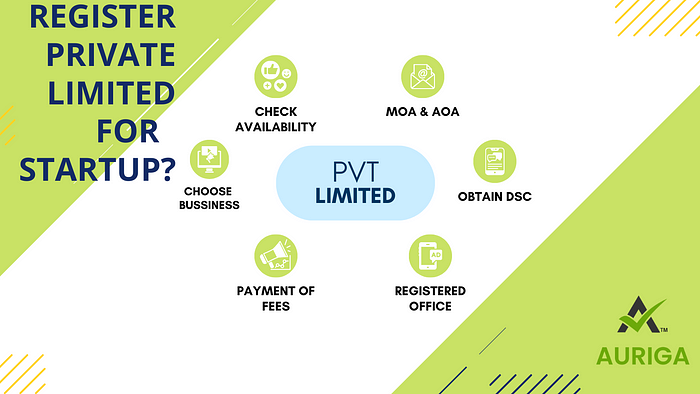How do I register a private Limited company for a startup?

Choose a Business Name, Check Availability, Drafting Memorandum, and Articles of Association, Appoint Directors and Shareholders, Registered Office Address, Obtain Digital Signatures, File for Incorporation, Payment of Fees, Receive a Certificate of Incorporation
Registering a private limited company for your startup involves several steps. Keep in mind that the process may vary depending on the country you're in. Below is a general guide that you can follow:
1. Choose a Business Name:
Select a unique and appropriate name for your company. Ensure it complies with the naming guidelines of your country's business registry.
2. Check Availability:
Verify the availability of the chosen name with the business registrar to ensure it's not already in use.
3. Drafting Memorandum and Articles of Association:
These are legal documents outlining the company's constitution, objectives, and rules for internal management.
4. Appoint Directors and Shareholders:
Identify and appoint directors and shareholders. Private limited companies often require at least one director and shareholder, and they can be the same person.
5. Registered Office Address:
Provide the registered office address for the company. This is the official address for legal communications.
6. Obtain Digital Signatures:
In some countries, directors and subscribers need digital signatures for filing documents online.
7. File for Incorporation:
Prepare the necessary documents, including the Memorandum and Articles of Association, and file them with the relevant government authority or business registrar.
8. Payment of Fees:
Pay the required registration fees. The amount may vary depending on your country and the type of services offered.
9. Receive Certificate of Incorporation:
Once your application is approved, you will receive a Certificate of Incorporation. This document confirms the existence of your company.
10. Apply for PAN and TAN:
Obtain a Permanent Account Number (PAN) for your company. In some countries, you'll also need a Tax Deduction and Collection Account Number (TAN).
11. Open a Business Bank Account:
Use the Certificate of Incorporation and other relevant documents to open a business bank account in the company's name.
12. Compliance with Tax Regulations:
Understand and comply with the tax regulations applicable to your business. This may include GST, VAT, or other local taxes.
13. Maintain Statutory Records:
Keep records of board meetings, shareholder meetings, and other statutory records as required by law.
14. Obtain Licenses and Permits:
Depending on your industry, you may need specific licenses and permits to operate legally.
15. Compliance with Annual Filing Requirements:
Be aware of and comply with annual filing requirements, such as submitting annual financial statements and tax returns.
16. Seek Professional Advice:
Consider seeking advice from a legal or financial professional to ensure compliance with all legal and regulatory requirements. Auriga accounting helps to register a private Limited company for a startup
Accounting and financial services firms like Auriga Accounting may offer the following assistance during the registration process:

- Business Structure and Planning: Auriga accounting Guide on choosing the right business structure, such as a private limited company, based on the nature and goals of your startup.
2. Name Availability Check: Auriga accounting Assists in checking the availability of your chosen business name and suggests alternatives if needed.
3. Document Preparation: Auriga accounting Helps in drafting and preparing essential documents, including the Memorandum and Articles of Association, which are crucial for the incorporation process.
4. Submission of Documents: Auriga accounting Facilitates the submission of necessary documents to the relevant government authorities for company registration.
5. Digital Signatures: Auriga accounting Assists in obtaining digital signatures if required for online filing
6. Coordination with Authorities: Auriga accounting Communicate with the business registry or government authorities on your behalf, streamlining the registration process.
7. Fees and Payments: Auriga accounting Provides information on registration fees and assists in making the necessary payments to complete the registration process.
8. Follow-Up: Auriga accounting Follow up on the status of your application and address any issues or requests for additional information from the authorities.
9. Post-Incorporation Services: Auriga accountingOffer ongoing accounting, tax, and compliance services to ensure that your company remains in good standing with regulatory requirements.
10. Tax Planning: Auriga accounting Provides advice on tax planning and compliance, helping your startup navigate tax regulations.

